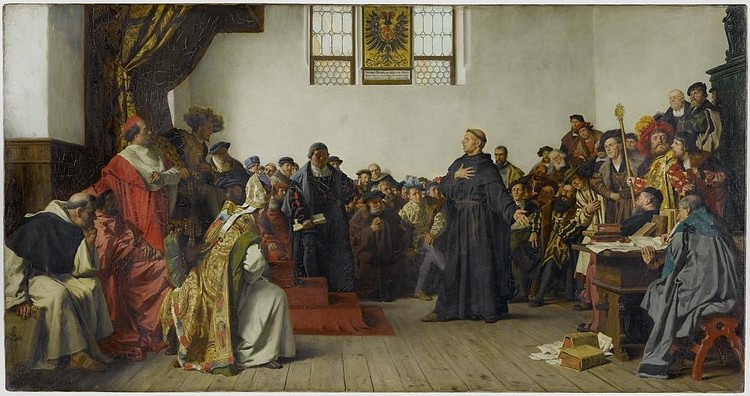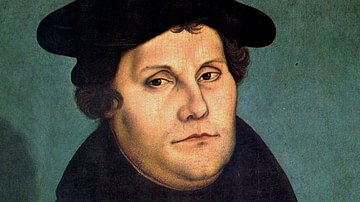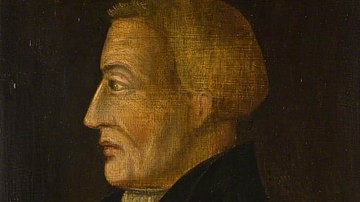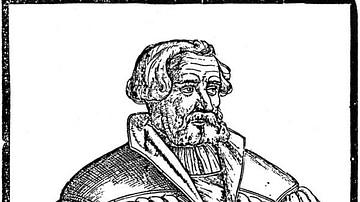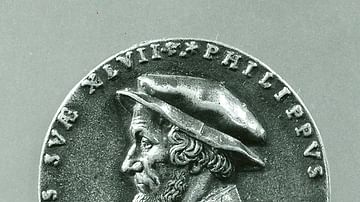Martin Luther's speech at the Diet of Worms (also known as the Here I Stand Speech) is considered one of the greatest pieces of oratory in world history. It was given in response to the council's questions on whether Luther would stand by his doctrine or recant. His refusal to recant is a classic defense of personal freedom.
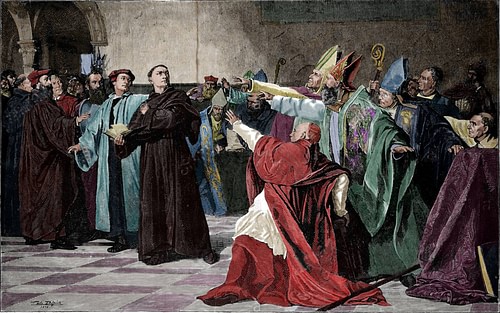
Martin Luther (l. 1483-1546) was a German theologian, priest, monk, and professor at the University at Wittenberg, who began to question the policies of the Roman Catholic Church at a time when the Church's authority was absolute. He was not the first to do so as there had been earlier movements and figures such as John Wycliffe (l. 1330-1384) and Jan Hus (l. c. 1369-1415) advocating for church reform. The Church was able to silence these proto-reformers but could not do so with Luther owing to his brilliant use of the printing press, which enabled widespread dissemination of his views, and his personal power as a speaker and writer.
Luther never initially intended to break with the Church, only to amend what he saw as abuse and corruption, but when the Church attempted to silence him, as it had with Hus, he stood his ground and, supported by peasants and some powerful nobles, inspired and informed the movement that became the Protestant Reformation. His speech at Worms is central to the beginning of that movement.
Luther & Worms
Luther first came to the attention of the Church as a potential problem when his 95 Theses were translated from Latin to German and published in 1518. Martin Luther's 95 Theses were ninety-five disputations offered for scholarly debate by Luther to fellow clergy and, according to the traditional account, posted on the door of the Wittenberg church on 31 October 1517. Luther's supporters translated and published the work in Germany, which was then part of the Holy Roman Empire, in early 1518, and it was then translated and spread to other countries by 1519.
Luther's views were challenged by the Church repeatedly between 1518-1520, but he remained faithful to his vision, claiming he would gladly recant if he could be proven wrong by scripture. Around 1513, he had become convinced that one only needed the Bible and one's faith to commune with the divine and the Church's policies were unbiblical and self-serving. In January 1521, he was excommunicated and called to appear before the Diet of Worms.
The Diet of Worms (an imperial assembly at the city of Worms, Germany) was not called specifically to deal with Luther, his case was only one of many matters to be dealt with, but it has come to be synonymous with Luther's vision and the Protestant Reformation. It was convened by Charles V, Holy Roman Emperor (r. 1519-1556) and was a secular assembly which, even so, included church officials because the Church was deeply involved in secular affairs at the time. Further, the Church required representation to deal specifically with Luther. He had been granted safe passage to and from Worms by the nobleman Frederick III (the Wise, l. 1463-1525) of Saxony, who secretly supported him, as did a number of others. The assembly convened in January 1521, but Luther did not appear until April.
On 17 April 1521, he was asked if the books, whose titles had been read aloud by the council were his and whether he would stand by their contents – some of which was considered heretical and a threat to the Church's authority – or recant. If he chose to recant and repent of the works, he could be welcomed back into the Church; if he refused, he would be branded a heretic and could be burned at the stake.
Luther requested an adjournment to formulate a response, and the Diet reconvened the next day. The papal nuncio, Aleander, who questioned Luther, had been careful to formulate the examination to prevent Luther from making a speech. Luther's tactic of the adjournment negated Aleander's in that Luther was now expected to provide a longer answer. In a remarkable display of courage and conviction, Luther delivered his speech, first in German and then in Latin, on 18 April 1521, refusing to recant and clearly stating what he stood for and why.
The Text
The following translation comes from The History of the Reformation in the Sixteenth Century by Jean-Henri Merle d'Aubigne (l. 1794-1872), translated by David Dundas Scott. Slight changes have been made in spelling and punctuation and passages clarified by Lyndal Roper's Martin Luther: Renegade and Prophet and Roland H. Bainton's Here I Stand: A Life of Martin Luther. Biblical citations are from the original text.
Most Serene Emperor, Illustrious Princes, Gracious Lords:
I this day appear before you in all humility, according to your command, and I implore your Majesty and your august highnesses, by the mercies of God, to listen with favor to the defense of a cause which I am well assured is just and right. I ask pardon, if by reason of my ignorance, I am wanting in the manners that befit a court; for I have not been brought up in king's palaces, but in the seclusion of a cloister and I claim no other merit than that of having spoken and written with the simplicity of mind which regards nothing but the glory of God and the pure instruction of the people of Christ.
Two questions were yesterday put to me by his imperial majesty; the first, whether I was the author of the books whose titles were read; the second, whether I wished to revoke or defend the doctrine I have taught. I answered the first directly, and I adhere to that answer: that these books are mine and published by me, except so far as they may have been altered or interpolated by the craft or officiousness of opponents. As for the second question, I am now about to reply to it and I must first entreat your Majesty and your Highnesses to deign to consider that I have composed writings on very different subjects. In some, I have discussed faith and good works, in a spirit at once so pure, clear, and Christian, that even my adversaries themselves, far from finding anything to censure, confess that these writings are profitable, and deserve to be perused by devout persons. The pope's bull, violent as it is, acknowledges this. What, then, should I be doing if I were now to retract these writings? Wretched man! I alone, of all men living, should be abandoning truths approved by the unanimous vote of friends and enemies, and should be opposing doctrines that the whole world glorifies in confessing!
I have composed, secondly, certain works against the papacy, wherein I have attacked such as by false doctrines, irregular lives, and scandalous examples, afflict the Christian world, and ruin the bodies and souls of men. And is not this confirmed by the grief of all who fear God? Is it not manifest that the laws and human doctrines of the popes entangle, vex, and distress the consciences of the faithful, while the crying and endless extortions of Rome engulf the property and wealth of Christendom, and more particularly of this illustrious nation? Yet it is a perpetual statute that the laws and doctrines of the pope be held erroneous and reprobate when they are contrary to the Gospel and the opinions of the Church fathers.
If I were to revoke what I have written on that subject, what should I do but strengthen this tyranny and open a wider door to so many and flagrant impieties? Bearing down all resistance with fresh fury, we should behold these proud men swell, foam, and rage more than ever! And not merely would the yoke which now weighs down Christians be made more grinding by my retraction, it would thereby become, so to speak, lawful, for, by my retraction, it would receive confirmation from your most serene majesty, and all the States of the Empire. Great God! I should thus be like to an infamous cloak, used to hide and cover over every kind of malice and tyranny.
In the third and last place, I have written some books against private individuals, who had undertaken to defend the tyranny of Rome by destroying the faith. I freely confess that I may have attacked such persons with more violence than was consistent with my profession as an ecclesiastic; I do not think of myself as a saint, but neither can I retract these books. Because I should, by so doing, sanction the impieties of my opponents, and they would thence take occasion to crush God's people with still more cruelty.
Yet, as I am a mere man, and not God, I will defend myself after the example of Jesus Christ, who said: "If I have spoken evil, bear witness against me; but if well, why doest thou strike me?" (John 18:23). How much more should I, who am but dust and ashes, and so prone to error, desire that everyone should bring forward what he can against my doctrine. Therefore, most serene emperor, and you illustrious princes, and all, whether high or low, who hear me, I implore you by the mercies of God to prove to me by the writings of the prophets and apostles that I am in error. As soon as I shall be convinced, I will instantly retract all my errors, and will myself be the first to seize my writings and commit them to the flames.
What I have just said will, I think, clearly show that I have well considered and weighed, not only the dangers to which I am exposing myself, but also the parties and dissentions excited in the world by means of my doctrine, of which I was yesterday so gravely admonished. But far from being dismayed by them, I rejoice exceedingly to see the Gospel this day, as of old, a cause of disturbance and disagreement; for such is the character and destiny of God's Word. "I came not to send peace unto the earth, but a sword," said Jesus Christ. "For I am come to set a man at variance against his father and the daughter against her mother and the daughter-in-law against her mother-in-law and a man's foes shall be those of his own household." (Matthew 10:34-36)
God is wonderful and terrible in His counsels. Let us have a care, lest in our endeavors to arrest discords, we be bound to fight against the holy word of God and bring down upon our heads a frightful deluge of inextricable dangers, present disaster, and everlasting desolations. Let us have a care that the reign of the young and noble prince, the Emperor Charles, on whom, next to God, we build so many hopes, should not only commence, but continue and terminate its course, under the most favorable auspices.
I might cite examples drawn from the oracles of God. I might speak of Pharaohs, of kings in Babylon, or of Israel, who were never more contributing to their own ruin than when, by measures in appearances most prudent, they thought to establish their authority! God removeth the mountains and they know not (Job 9:5). In speaking thus, I do not suppose that such noble princes have need of my poor judgment; but I wish to acquit myself of a duty whose fulfillment my native Germany has a right to expect from her children. And so, commending myself to your august majesty, and your most serene highnesses, I beseech you in all humility, not to permit the hatred of my enemies to rain upon me an indignation I have not deserved. I have done.
[At this point in the hearing, Luther was asked by Charles V to repeat what he had said in German in Latin. He was told to answer simply, and without the art of oratory, whether he would retract his statements or stand by them. He then concluded with the most famous passage of his speech.]
Since your most serene majesty and your highnesses require of me a simple, clear, and direct answer, I will give one, and it is this: I cannot submit my faith either to the pope or to the council, because it is clear that they have fallen into error and even into inconsistency with themselves. If, then, I am not convinced by proof from Holy Scripture, or by cogent reasons, if I am not satisfied by the very text I have cited, and if my judgment is not in this way brought into subjection to God's word, I neither can nor will retract anything; for it cannot be either safe or honest for a Christian to speak against his conscience. Here I stand. I cannot do otherwise. God help me. Amen.
"Here I Stand" Line
The now-famous concluding sentence – "Here I stand. I cannot do otherwise" – is thought by modern scholars to have been added later, but this claim continues to be debated. Scholar Lyndal Roper notes, "If he did not say these words, this was the phrase that soon became famous. It certainly encapsulated the spirit of his appearance" (172). Scholar Roland H. Bainton comments:
The earliest printed version [of the speech] added the words: "Here I stand. I cannot do otherwise." The words, though not recorded on the spot, may nevertheless be genuine, because the listeners at the moment may have been too moved to write. (182)
Bainton could well be right as the power of the speech was recognized when it was given and prompted Charles V to personally write a refutation of it that same night. Luther's eloquent refusal to recant, and defense of his vision, was bold defiance of both secular and ecclesiastical authority, elevating his stature to that of any great saint or legendary heroic medieval knight.
Conclusion
Luther, always aware of the value of the dramatic, and encouraging this view of himself, is said to have concluded his speech by raising his arm in the traditional gesture of salute given by a knight after winning a bout. He was briefly questioned on whether this was his final statement and replied he had nothing more to add and would not recant. He then left the assembly as it adjourned, remaining in Worms a little over a week before setting out on his return to Wittenberg. During that time, a number of clerics suggested that Charles V revoke Luther's safe passage, arrest him, and have him executed as a heretic – the same as had been done with Jan Hus at the Council of Constance in 1415 – but Charles V refused, noting such an act would be dishonorable.
Luther, meanwhile, had left Worms and was abducted by a group of soldiers under Frederick III's command, posing as highwaymen. Only one among Luther's traveling companions knew this was a ruse and that Luther would be brought safely back to Frederick III's castle at Wartburg; the rest believed he had actually been kidnapped by bandits. If Frederick III had not intervened, it is almost certain that Luther would have been taken by the authorities and executed sooner or later because, on 25 May 1521, Charles V issued the Edict of Worms charging Luther with heresy and branding him a "notorious heretic" and outlaw. The edict meant he could be killed without any legal consequences for the murder. The Edict of Worms was never enforced, however, because Luther had become too popular and was protected by powerful nobles like Frederick III.
As with his 95 Theses, Luther's speech at Worms was printed and published, along with pamphlets depicting him as a champion of Christianity standing against the forces of darkness of the Church, which Luther and his supporters cast as anti-Christ. After Worms, challenges to the Church's authority increased in Germany and elsewhere through the Protestant Reformation.
The "Here I Stand" speech has remained one of the most popular and well-respected pieces of oratory since its 1521 publication, compared favorably with the greatest orations of all time, and it continues to inspire people in the present day. Although Luther had actively criticized the pope, policies, and ecclesiastics previously, his speech at Worms was the decisive blow that validated his vision in the eyes of his followers, eventually resulting in the end of the monolithic authority of the medieval Church.

